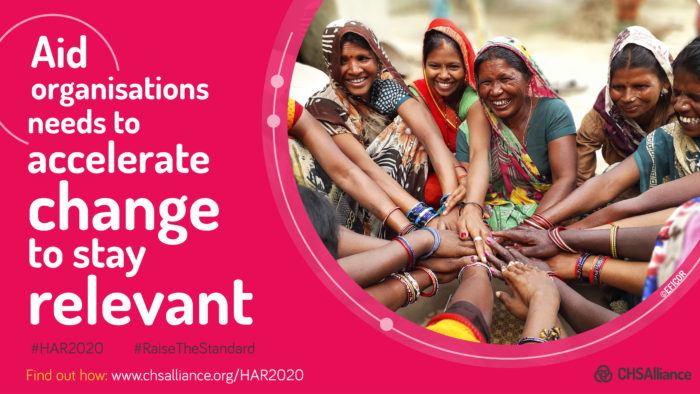Humanitarian Accountability Report (HAR) 2020 Launched – #RaisetheStandard
October 2020
As a member of the CHS Alliance, Community World Service Asia is committed to making aid work better for crisis-affected people. Along with more than 150 other leading aid organisations that form the Alliance, we are excited to share news of the launch of a landmark study – the Humanitarian Accountability Report (HAR) 2020;. The HAR 2020 presents an evidence-based overview of how accountable the aid sector really is to people caught up in crises across the world.
There are many milestones on the road to greater accountability, and this report by the CHS Alliance marks a number of them. It offers valuable insight into the effectiveness of humanitarian responses, which in turn helps to make the sector more accountable.
Notes Kitty van der Heijden, Director General for International Cooperation, Ministry of Foreign Affairs, The Netherlands in the HAR 2020 forward.
Overcoming vital accountability barriers
Five years since humanitarians came together to launch the Core Humanitarian Standard on Quality and Accountability (CHS), many dedicated aid organisations are making significant progress on vital accountability issues that the sector has been tackling for decades. The HAR 2020 shows that aid organisations, such as [insert your organisation name] can tackle the toughest barriers to meeting the commitments they made to people affected by crisis.
This progress shows CHS verification is a catalyst to make aid more accountable.
Community World Service Asia (CWSA) is committed to promote Sphere Standards and Core Humanitarian standards in Pakistan and in the Asia Region as Alliance member of CHS and Sphere regional focal point. Our work aims at increasing the effectiveness of humanitarian response through enhancing Quality and Accountability (Q&A) mechanisms of front-line national organizations in Asia. CWSA is promoting CHS and CHS Alliance membership in Pakistan.
The nine commitment relate with the organization’s process, procedures, policies and practices to ensure effective, efficient, transparent and accountable response to the people effected by crises, conflict or disaster. CWSA provides customized trainings for national and international organizations on Sphere Handbook 2018, and Core Humanitarian Standards (CHS). These trainings build capacity of organizations on Core Humanitarian Standards (CHS) and further support them to go for CHS Self-Assessment.
CWSA facilitates the partner academic institutions in developing Competency-Based Guideline for Field Work Practicum based on Core Humanitarian Competency Framework (CHCF). The guidelines and the tools developed by this process will be competency based. It will help create clarity in the role of supervisor; facilitate students in identifying required knowledge area, skill and technical expertise to work on during the field placement and help host agencies to work with the students with clear direction and agreed objectives.
Accelerate change
Yet the HAR 2020 reveals that the aid sector has not reached its goals. CHS Commitment 6 on coordination and complementarity is the closest to being fully met by verified organisations, while Commitment 5 on welcoming and addressing complaints is the lowest scoring.
The HAR 2020 reveals that we are not yet seeing system-wide acceleration towards a transformative approach that gives communities and people affected by crisis strategic influence over aid. To accelerate the pace of change, the HAR 2020 finds that committed aid organisations need to harness the power of the multiplier effect; they must intensify their efforts on three cross-cutting actions that raise the standard of aid across the board:
- Engage crisis-affected people: strive for the Participation Revolution we committed to.
- Maximise knowledge and information: in the information age, the humanitarian system needs to get up to speed.
- Adapt flexibly to meet current needs: organisations need to adjust rapidly to changing contexts.
Critical mass needed
Currently, more than 90 organisations have engaged in CHS verification, yet even with renewed efforts by those already applying the CHS, more need to make similar changes at the same time. No humanitarian organisation works in a vacuum. A critical mass of aid actors must unite around the CHS in concert to truly make aid work better for people affected by crisis and fulfil the commitments the sector made to crisis-affected people in 2015.
Today we lay down a challenge to the aid sector,” said CHS Alliance Executive Director Tanya Wood at the HAR 2020 launch event. “The HAR 2020 shows that dedicated aid organisations can tackle the toughest barriers to delivering accountability commitments made to crisis-affected people; but they need the right tool – the CHS – and they cannot do it alone. We need a critical mass of organisations, including NGOs, donors, UN agencies and networks to apply and recognise the CHS in concert to effect real, urgent change. I urge every humanitarian committed to making aid work better for people affected by crisis to read, debate and share the findings of HAR 2020. Together, we can meet our commitments and Raise the Standard of our work.
Full report findings and recommendations can be accessed on the CHS Alliance website. Read, debate and share the HAR 2020 with all your partners committed to making aid work better for people affected by crisis: www.chsalliance.org/HAR2020.







